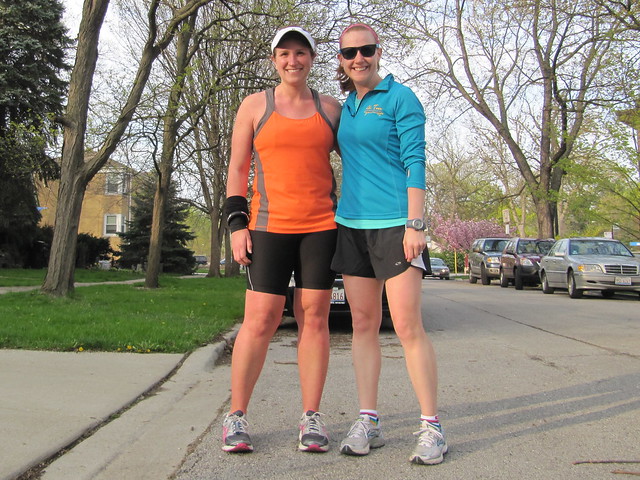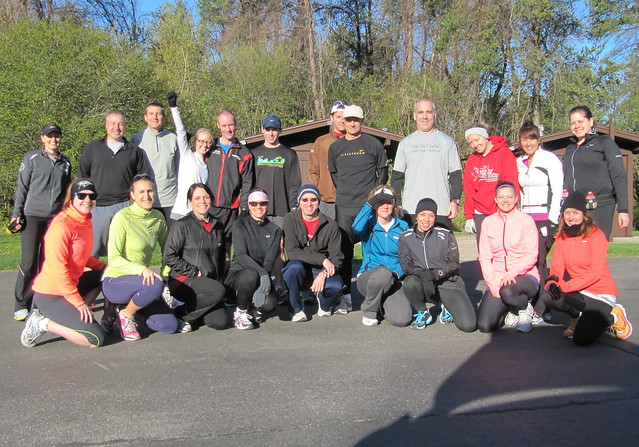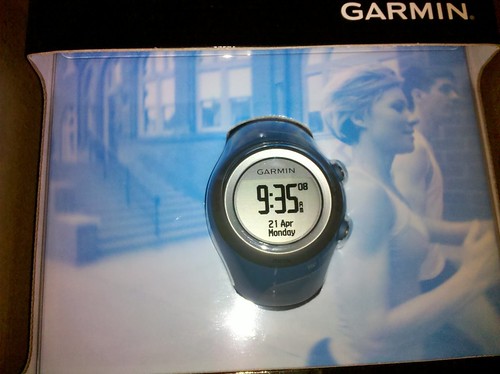 |
| This would just stress me out. |
One thing that still makes me feel like a novice runner is the fact that I still get nervous/intimidated by long runs. Basically any distance that takes me out of my comfort zone. When the weather's hot, that distance is around 7+ miles. In more comfortable temps, runs of 9+ miles intimidate me.
Why?
Well, some of it is based on experience. And others are based on the "what ifs?"
Such as ... What if I'm miles from home/my car, and ...
- I have to go to the bathroom? Like, really go? [Been there. Not fun.]
- I'm not just thirsty, but feeling dehydrated? Like, I will drink water out of this dirty puddle dehydrated? [Been there too. Didn't drink puddle water but did call husband.]
- [If it's hot], I'm starting to feel heat stroke? [If it's cold], I'm starting to feel numb?
- Severe weather rolls in? (This is only a concern if the current weather or forecast call for it, but sometimes if you've planned your whole weekend around your long run, you just have to get out there.)
- I get injured or feel severe pain?
- I just can't go any farther?
These are just the things that go through my mind when thinking about / planning for a long run. I'm sure there are others that might cross your mind.
So, to me, it's not the miles that intimidates me (well, not totally). It's everything else. It's the thought of being stranded miles from home with some problem. But if I can eliminate all those other nagging "what ifs," then I can just focus on my running.
For me, this is how I eliminate the what ifs.
Bring my phone with me. That way if something goes wrong, I can call my husband. This only works if he is home and available to come assist me. But I hate running with my phone. It's bulky. So I usually don't do this.
Plan my run to stop at home or at my car (and a bathroom of some sort) every few miles. It didn't occur to me to do this for awhile. Not until I overheard a co-worker talking to another co-worker about her marathon training, and she mentioned that when she runs long distances, she does 5 miles, stops at home, does 5 miles again, etc. When I heard that, I thought it was so brilliant, and so simple, why didn't I think of that? Why did I think my entire long run had to be done in one lump, and I wasn't allowed to set foot at home or go into my car until it was done? Now, in addition to planning my runs to pass by as many drinking fountains as I can (at least while the temps are high), I plan my long runs to stop by my house every few miles. (Every 3-4 miles on hot days, every 5 or so on cooler days.)
This helps for two reasons:
- It breaks up my run. Now, I don't think of it like I'm running 12 miles. I think that I'm running 4 miles, 3 times. That sounds so much more doable.
- It eliminates all the worry. I know that if I suddenly have to go to the bathroom, I'll be home in a short distance. Same goes for if I get really thirsty (or need some electrolytes), or it starts storming, or I feel serious pain, or if I need to adjust my clothes (maybe I'm chaffing or I dressed much warmer than I should have).
Other things you can do (that I do not do): Before your run, hide some water or sports drink along your route. (I just don't trust other people not to steal it or tamper with it.) Or, bring cash with you so you can buy water or a sports drink while your out. (But then you have to carry a partially empty, sloshing bottle.)
Yes, stopping at home during my runs slows me down, and it gets me in the habit of stopping during my running (and thinking I need to go pee more than I do), but when you're running a race you have support - water stations, some with a sports drink, and medical tents and port-a-potties, etc. This is how I can build that into my training runs. Plus I'm not trying to win. I'm just trying to finish and do a decent job to the best of my ability.
But most importantly for me, doing this eliminates the worry, the intimidation, the nagging "what ifs" and allows me to just focus on running.
Do you have anything that intimidates you about running? How do you deal with it?









